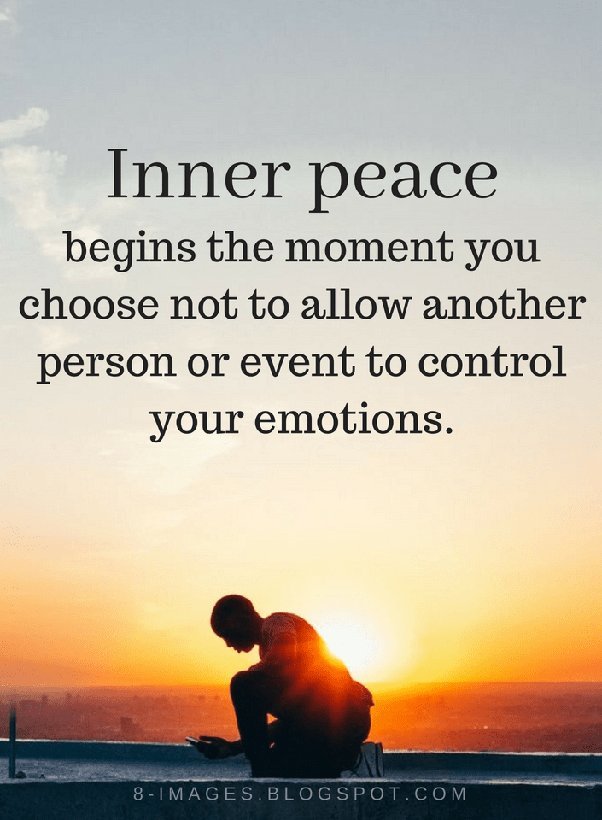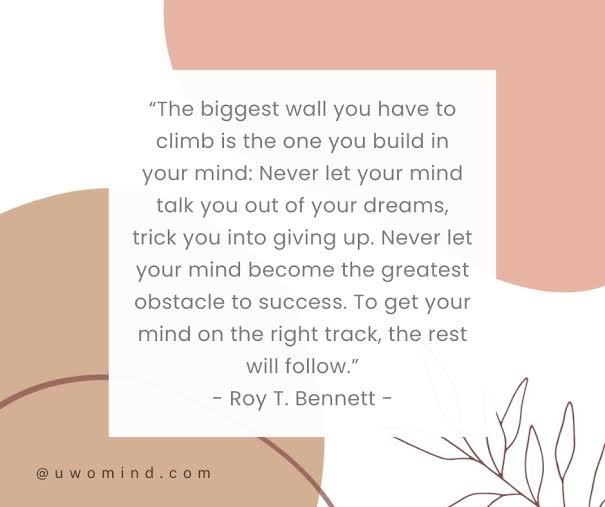




It’s important to remember that anxiety is a natural emotion that everyone experiences at some point in their life, and it can be managed and overcome. Believe that all things happen for a purpose and will eventually fade away. View it as an experiment or challenge and endure it to gain freedom, or see it as a new injury and acknowledge that it will eventually recover. Acknowledge that it lacks a solid foundation.
- Acceptance : A key factor in dealing with depression is embracing acceptance. What is going to happen, happened and it’s now a part of me that I have to live with. It can’t be undone, but I must find a way to navigate through it. My new journey starts here, and I won’t let circumstances and emotions defeat me. Identifying the root cause, addressing it, facing it, and accepting it is crucial. It’s like saying, “I acknowledge your existence, and I will coexist with you.” For example, if someone is born with a disability or mental health condition, they may have to accept their fate. This can help to minimize the intensity of the challenges they face.
- Always Be Positive : Cultivating a positive mindset can have a significant impact on reducing anxiety and improving overall well-being. To achieve this, it is important to reframe negative thoughts and see challenges as opportunities for growth and learning. Rather than seeing life as a big ball of stress, it’s crucial to see each issue individually, smaller, and more manageable. One should deliberately focus on positive and diverse thoughts to shift one’s mindset and improve overall mood. To fill your mind with positive thoughts, one can engage in activities that bring joy, practice mindfulness and meditation, seek out inspirational and uplifting content, and focus on gratitude and the positive aspects of life.
- Handle Anxiety and Depression: To manage anxiety, acknowledge and accept it as a temporary state. Don’t let it consume your life; instead, focus on the present moment, break down stressors into smaller parts, and control what you can. Empower yourself by focusing on what’s working and changing your perception of life’s challenges. Reframe negative thoughts, see challenges as opportunities, and cultivate a positive mindset for reducing anxiety and improving overall well-being. Stop connecting all the matters of stress and miseries together and seeing your life as a big ball of stress rather view stressors as distinct events rather than a collective source of stress, and shift your perspective on life and its obstacles
- Personal Care : Taking care of oneself is crucial for maintaining good physical and mental health. Personal care involves several key practices, such as exercising regularly, getting enough sleep, eating a healthy diet, avoiding dopamine and drugs, and practicing self-care. Regular exercise helps to release natural mood boosters and reduce stress, while getting sufficient sleep of at least 7-8 hours per night can prevent the exacerbation of anxiety and depression symptoms. A healthy, balanced diet consisting of whole foods, lean protein, fruits, vegetables, and healthy fats supports overall physical and mental health. Substance abuse worsens anxiety and depression symptoms, so it’s best to avoid alcohol and drugs. Engaging in activities that bring joy and relaxation, such as reading, listening to music, taking a bath, or spending time in nature, is essential for self-care. Taking time out for oneself each day is crucial for maintaining good personal care practices.
- Call upon the Divine: Being a firm believer, leaving your issues and surrendering your worries to the higher power and having faith in it can be immensely helpful. Don’t be disheartened by the fact that God might not have answered the prayers of others in similar situations or yours previously. Some things are destined to happen, while others can be avoided. Strengthen your faith and trust the Almighty to assist you. Recite prayers, converse with the Divine, have faith, and stay positive.
- Connect with others: Isolation and loneliness can worsen anxiety and depression. Reach out to friends and family members for support, or consider joining a support group. Once you have dealt with the source of your anxiety, shift your focus away from it. Do not dwell on it, but instead engage in activities, discussions, and tasks that keep you occupied and help you disconnect from the matter at hand.
- Volunteering Service : It is a fulfilling way to spend time that offers numerous benefits. Studies show that it can alleviate depression by reducing isolation and loneliness. Volunteering helps create a sense of belonging and social support by connecting individuals with similar interests and values. Moreover, volunteering can boost self-esteem and confidence by providing a sense of accomplishment and pride. It can also combat stress and anxiety by focusing on meaningful activities and distracting individuals from negative thoughts. Volunteering allows individuals to make a difference in the lives of others while improving their mental health and well-being.
Remember that coping with anxiety and depression is a journey, and what works for one person may not work for another. It’s important to find what strategies work best for you and to seek professional help if needed. Do address this issue and visit a psychiatrist for clinical anxiety without feeling embarrassed or delays.



